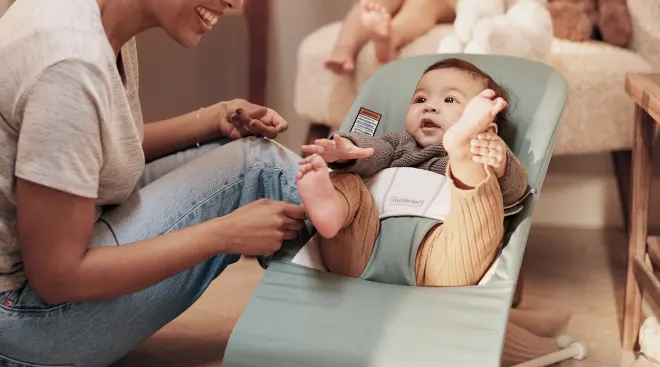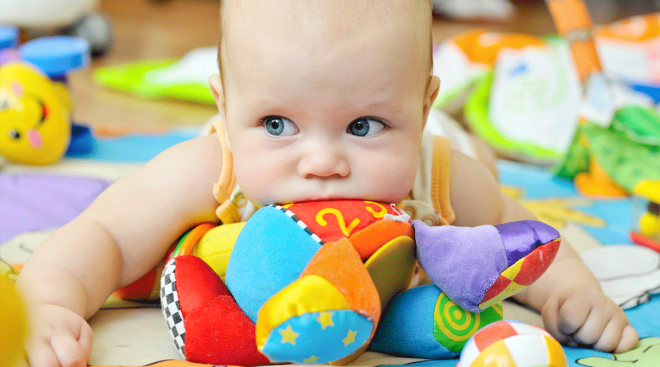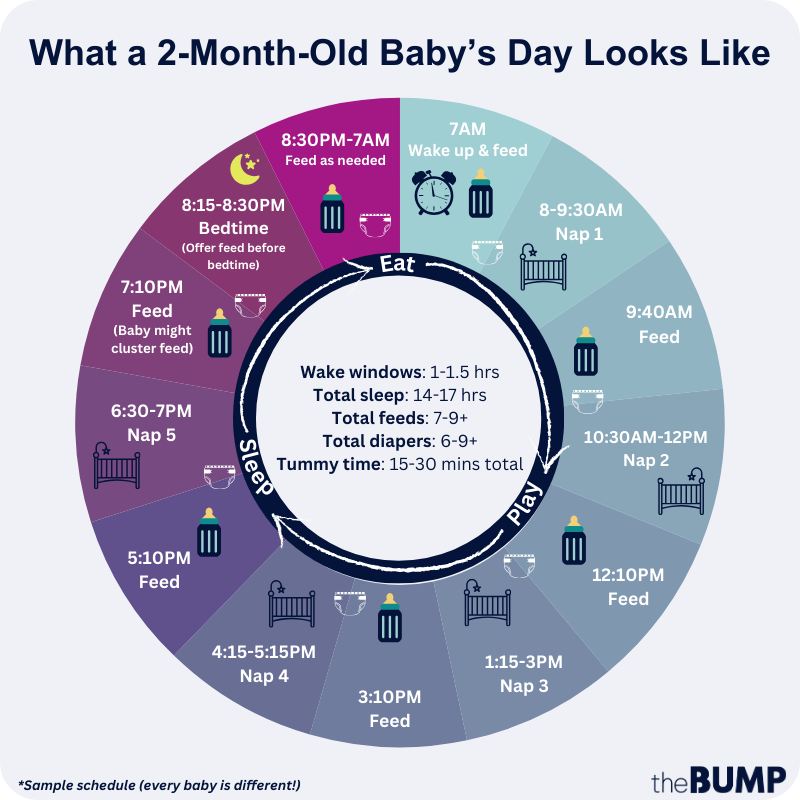2-Month-Old Baby

What happened to that sleepy baby? Your 2-month-old is probably just starting to realize the joys of interaction, and may have cut back a bit on snoozing so much during the day to stay up and "socialize." Now you're probably trying to figure out how to keep baby entertained—and get stuff done around the house at the same time. This hopefully also means you're getting a little extra sleep at night. (Isn't sleep amazing?!) Not there yet? Don't worry. You’ll sleep again—and it might be sooner than you think!
You may be settling into your role as a new parent, but there’s a lot to learn about your quickly developing baby. You’ve got questions about your 2-month-old baby, and we’ve got answers. So what do 2-month-old babies understand at this point? Can you let your 2-month-old sleep through the night? And what are all the 2-month-old baby milestones on the horizon? We’re sharing everything you want to know about this exciting stage.
- While baby might be sleeping more (or at least waking up a little less at night), the two-month mark is a big period for crying and fussiness. The good news is that within the next month or two, it should taper down.
- Cooing and smiling is very much on the table with your little one! As you talk to baby, they may be responding with heart-melting coos, gurgles and smiles.
- This month, baby’s due to get quite a few vaccines. While it may seem like a lot, immunizations protect baby against harmful diseases and are completely safe.
Baby’s getting bigger! Your 2-month-old baby has probably gained around 1.5 to 2 pounds and grown about 1 to 1.5 inches in the past month. Their head may be half an inch bigger too.
The average weight of a 2-month-old baby is between 5 and 11.5 pounds for girls and between 5 and 12 pounds for boys. Length (aka height) averages are between 18 and 22 inches for girls and between 19 and 22.5 inches for boys, according to the World Health Organization.
It’s normal to wonder how much a 2-month-old should weigh and measure—but always remember that healthy babies vary in size, and don’t get too caught up with comparing your child’s weight to the “average.” Instead, it’s about growth—your 2-month-old should follow a steady upswing on the growth chart at the pediatrician’s office. If that’s happening, then they’re right on track.
Where has the time gone? These last two months may have felt like a total (sleep-deprived) blur. And, quite suddenly, your helpless newborn is gaining physical strength and unique traits. Want to know what 2-month-old milestones to expect in the coming days and weeks? There’s a lot on the docket. “What should my 2-month-old be doing?” you ask? Here are some milestones they may be working on:
- Baby’s getting stronger, perhaps lifting their shoulders during tummy time and their head while in a seated position. Give baby plenty of time on their belly, so they can practice lifting their head, which will strengthen the neck muscles!
- Baby’s movements might start to look less jerky and more fluid. They’re trying out new positions and strengthening and coordinating those muscles.
- Baby’s becoming more aware and playful with their hands. Your little one may have started self-soothing by sucking on those itty-bitty fists.
- Baby has gradually become a social butterfly, responding to you with gurgles, coos, ahhs and ohhs and even smiles.
- Look out for your cutie’s first smile. This is a major 2-month-old baby milestone you won’t want to miss. At this age, baby might begin responding to social interactions with a big gummy grin. (Be prepared to swoon!)
2-month-old sensory development
There’s a lot going on with baby’s senses at 2 months old:
- Baby’s eyes are moving more and can focus better on objects. In fact, your 2-month-old baby can probably track a moving object, following it with their gaze.
- Do 2-month-old babies recognize their parents? Good news: Yes, babies typically begin recognizing caregivers’ faces by the three-month mark.
- At this point, your 2-month-old baby might also be starting to realize that voices and faces go together. They may also understand that they can communicate with different kinds of cries. Baby may have a hungry cry that’s different from their sleepy cry. With each passing day, baby begins to learn and understand more about the world around them.
- Baby’s really interested in what you have to say. When you talk, you might notice that your little one is actively listening. They might even try to respond by cooing, or moving their arms and legs in delight at your back-and-forth “conversation.”
- Two-month-old babies are comforted by touch; snuggle time might be their go-to for a while.
“The best way to bond and develop language at this age is to interact and talk to your baby throughout the day. Narrate what you’re doing, and point out and name different objects you encounter.” — Ansley Schulte, MD, pediatric medical director at KidsPeace in Orefield, Pennsylvania
As your 2-month-old baby continues to grow and develop—physically and in personality—it’s easy to find yourself wondering if every little change and symptom is normal. Here are some common health concerns parents of 2-month-olds have:
Acid reflux
If baby spits up due to reflux—even daily—it’s likely not a problem. Acid reflux is very common in babies due to their sensitive digestive systems and typically goes away before 12 months. Call your pediatrician if baby’s mostly vomiting rather than spitting up, if symptoms get worse or if baby’s not gaining weight.
Diaper rash
Reddened skin in baby’s diaper area is caused by chafing or rubbing (like when a diaper’s on for too long), too much moisture, or sometimes allergies or infections. You can try to prevent it by keeping baby clean and dry and watching for any signs of irritation, but rest assured that mild diaper rash is common and normal. However, baby’s diaper rash could also be a sign of a yeast infection, bacteria or an allergy, so flag any persistent rashes to your child’s pediatrician.
Eczema
Baby eczema is a common condition that can make baby’s skin dry, itchy, bumpy or discolored. It can be triggered by temperature, allergens, clothing materials, or the chemicals in soaps and detergents. Eczema usually starts on the scalp and face, and can create red, dry rashes on the cheeks, forehead and around the mouth. The best treatment is applying moisturizer daily, as well as avoiding triggers. Your pediatrician may also prescribe a topical corticosteroid to reduce itching and swelling.
Cross-eyed baby
It’s normal for baby’s eyes to occasionally wander and cross at this age since their vision is still developing. By the time baby’s around 4 months old, they’ll typically be able to move their eyes together with no issues. If this doesn’t happen by the time they’re around 6 months old, check in with your pediatrician. Baby might have strabismus, which is a treatable condition.
Checkup and vaccines
This is a big vaccine month. After their regular checkup, your 2-month-old will receive the pneumococcal (PCV13), DTaP, Hib, poliovirus and Rotavirus immunizations. If baby didn’t get a second dose of the Hepatitis B vaccine, they’ll receive that as well. A small silver lining: Some shots can be combined, so there’s less pricking. You can keep baby comfortable by holding them as they’re getting their shots—and breastfeeding if you choose to.
Whether you’re bottle-feeding or breastfeeding, getting baby fed is still probably taking up a large part of the day. Continue to follow baby’s hunger signals (smacking lips, sucking, that cry!), and when they’re full (turns away from the bottle, gets distracted, falls asleep), you can feel reassured that baby’s well nourished.
Two-month-olds should still be sticking to just breast milk or formula for feedings. One common question is: Can you give a 2-month-old water? And the answer is no. Both solid foods and water can be introduced around the six-month mark—give or take. Talk to the pediatrician to decide when might be the right time for your baby.
How much should a 2-month-old eat?
- Breastfeeding: How often should a 2-month-old nurse? About every two to four hours. Be sure to check in with your pediatrician if baby’s not gaining weight as expected.
- Bottle-feeding: How much formula does a 2-month-old eat? Your bottle-fed baby probably feeds every three to four hours. Just like adults, they might have a meal where they’re extra hungry or don't eat much at all. That’s normal.
Ready, set, wake! Sleep is still hard to come by, but your baby is making strides (even if it doesn’t feel that way at 3 a.m.). You don’t need to worry about setting a 2 month old sleep schedule, but a solid bedtime routine can go a long way in giving baby a sense of predictability and security—and better sleep for the whole family.
2-month-old sleep schedule
How much should a 2-month-old sleep? A typical 2-month-old baby needs about 15 to 15.5 hours of sleep, but anywhere between 14 and 17 hours is normal. It’s common for babies at this age to sleep about nine hours at night (yes, it’s probably still interrupted sleep—that’s okay). Their daytime sleep needs are diminishing, and are close to around 6 hours.
Now that your 2-month-old baby is becoming more social, you might find they want to stay awake for longer stretches. This is totally fine and normal but unfortunately, some babies stay awake longer than they should and get overtired. An overtired baby is a cranky baby who’s harder to get to sleep!
How long should a 2-month-old sleep?
Duration of sleep for a 2-month-old baby can vary widely from baby to baby, but some parents report that their babies are sleeping for five- to six-hour stretches at night. (Yay!) If baby’s sleeping through the night (double yay!), go ahead and let them as long as they’re gaining weight appropriately.
Again, there’s no need for a 2 month old sleep schedule—it’s more important to establish patterns, so your little one gets into daily habits and starts to anticipate what’s coming next. This will set them up for being in a more distinct routine when they’re a bit older. Here’s an example of a day in the life of a 2-month-old:
While baby may still not be able to do a lot at this stage, you can find a few fun ways to engage them. Here are some ideas to kick start early playtime:
- Baby talk. Continue having conversations with your 2-month-old baby, encouraging them to coo and babble. These interactions are precious and priceless, and they help foster a strong bond between you and your sweetheart. Continue to make silly faces at baby and watch their reactions change.
- Go for a stroll. Your wee one loves fresh air and a change of scenery. BTW, it’ll do you some good too!
- Try a play gym. A playmat gives a 2-month-old baby a safe place to explore and lots of close-up visuals to enjoy. It’s also a great place to keep practicing tummy time, which will help them gain strength and foster skills that will eventually encourage rolling and crawling.
- Read to baby. Continue to build baby’s library of picture books and board books. Yes, baby is still very young at 2 months old, but making reading an early habit will help establish a routine and foster those all-important early language skills.
- Try a massage. Does baby seem cranky? A gentle massage can encourage relaxation. This is also a great way to bond and calm baby down.
As baby grows, you’re likely going through some changes too. Here’s how to navigate them.
Postpartum recovery tips
Postpartum recovery looks different for everyone, but here are a few topics you’ll want to know about this month:
- Dealing with postpartum night sweats. Yep, it can feel jarring to wake up in a puddle of sweat—but unfortunately, this is all too common after you have a baby. Postpartum night sweats are your body’s reaction to changing hormone levels after giving birth. Wearing light pajamas, using lightweight cotton sheets and sleeping with a towel under you can help.
- Postpartum hemorrhoids. Postpartum hemorrhoids are painful, itchy varicose veins in or around the anus. They usually get worse right after delivery and slowly get better after that. If you’re struggling, talk to your doctor about using OTC creams and suppositories. You can also apply witch hazel and ice packs to the area.
- Topsy-turvy hormones. Postpartum hormones can flood your body with all sorts of emotions, from euphoria to deep sadness. After all, this is one of the biggest hormonal change you’ll ever go through in your life! Your hormones need to reset after pregnancy, but it’s a process. This happens slowly after baby is born, but it can take up to six weeks for everything to go (more or less) back to normal.
- Sleep deprivation. It can be difficult to manage the stress of being a new parent, especially if you’re not sleeping well at night. If you’re able, ask a partner or other loved ones for help so you can get sleep. Finally, give yourself grace. This is a new thing for you, and it can take time to get adjusted to your new normal.
- Breastfeeding help. Getting a proper breastfeeding latch will allow baby to feed comfortably and keep you from being in pain. Check to make sure you and baby are lined up the right way. When baby is in proper nursing position, their jaws will come together on your areola and her lips will seal over your breast. If you have questions about breastfeeding, make sure to reach out to a lactation consultant or your child’s pediatrician for help.
2-month-old baby care tips
Here are a few things to keep in mind when taking care of baby this month:
- Calming a fussy baby. Helping baby calm down can be tricky, but there are a few methods you can try. Consider swaddling your little one, turning on a calming sound like white noise, walking baby in a carrier, or holding baby in your arms and placing them on their left side, which can help with digestion.
- Dressing baby for bedtime. Dress baby in layers, since they get colder than we do. The rule of thumb is to put baby in one more layer of clothes that you would wear. You can also swaddle baby or use a wearable blanket—just be sure that your little one is safely put to sleep on their back.
- Keeping baby in your bedroom. The American Academy of Pediatrics (AAP) recommends sharing a room—but not a bed—with baby until they’re at least 6 months to lower the risk of Sudden Infant Death Syndrome (SIDS). Place baby’s crib, bassinet, portable crib or play yard close to your bed.
- Managing guests around baby. After baby’s 2-month-old vaccines, you might be more comfortable having other people meet baby. Still, make sure guests wash their hands and stay away from baby if they’re sick.
- Piercing baby’s ears. Ear-piercing for babies is typically not recommended until they’re about 3 months old due to the danger of a potential infection. By 3 months, baby has typically had some vaccines and has a stronger immune system. If you choose to have baby’s ears pierced, make sure you choose a trusted and experienced provider who uses properly sterilized tools.
Parenting a 2-month-old is rewarding and fun (just watching them smile can make your entire day!). But it can also be a bumpy ride, with both wins and challenges. Let these stories from real parents inspire you in your own parenting.
- Win: “I'll sing ‘Head, shoulders, knees and toes…’ while she's in the bouncy chair. When I do the song to myself I bend down close to her face for ‘toes,’ and when I do it for her, I jiggle her legs at ‘knees'…she gets a real kick out of this song! We also do ‘If you're happy and you know it…’ I have her grasp my fingers so I can clap her hands with mine. For the second verse, I'll stomp her feet and sing ‘boom boom’ to replace the stomping sound. She also seems to like ‘Itsy Bitsy Spider.’ These interactive songs keep her very occupied for a while, and let me sit on the ottoman in front of her, giving my arms a break from giving her (yet another) tour of the house.” — TiaTia
- Challenge: “My daughter wakes up every two to three hours to eat and she chows down. She was five weeks early and at her two-month checkup she weighed almost 10 pounds and was 23 inches long. She barely sleeps at night and takes no naps during the day. That's right, no naps! She's up from 6 a.m. to 10 p.m.! I've tried everything to get her to sleep, but she's wide awake. Right now she's on a playmat on the floor, talking to the animals on the mobile above her. It's pretty cute, but Mommy needs some sleep. I go back to work on Friday and am afraid I’ll be totally exhausted!” — MrsZiz
- Wisdom: “My LO had his two-month shots yesterday and he screamed his little heart out. I think it was just too much for him, and I could see the shock of pain on his face with each one. My husband had to hold him down, I couldn't handle that part, so I stood next to him and stroked LO's hair. When it was over I picked him up and held him close, covered him with kisses and told him I was so proud of him. He calmed down in less than a minute.” — Abc15379
“My first baby despised tummy time and didn't spend much time on his stomach at all. He still developed typically! My second loved time on her tummy and started walking at the same time my son did.” — Megan Ridge Morris, mom of two in Bethlehem, Pennsylvania
Frequently Asked Questions
What is the witching hour?
Ah, the “witching hour"—likely your least favorite time of day, right? Babies become especially fussy and difficult to soothe at this time, typically occurring around 5 to 10 p.m. During the witching hour, baby will often want to cluster-feed (aka eat all the time)—which often goes hand-in-hand with growth spurts. Don’t worry; this is very common and expected, especially for breastfed babies. Bottom line: As exhausting as it may be, the witching hour is a perfectly normal part of development.
When will baby acne go away?
Newborn acne is common and can last until baby’s around 3 months old. The small white or red bumps, which are often concentrated on baby’s face and torso, are usually nothing to worry about and go away on their own. If baby’s acne persists after about 3 months of age, check in with your pediatrician—especially if you see larger, red blemishes or pustules.
Are baby loungers safe?
Baby loungers have been involved in several recalls over the past few years. The biggest concern is that if babies sleep in them, it raises their risk of suffocation. A baby should never sleep in or be left unattended in a baby lounger.
Can you sleep-train a 2-month-old?
If baby isn’t sleeping well, you may be wondering if sleep training a 2-month-old is possible. Sorry to say that most doctors will tell you to wait until baby is at least 4 months old. That’s when many babies tend to naturally feed less at night and have more established sleep patterns. There’s hope for the sleep-deprived though: You can start establishing a bedtime routine for baby now.
Two-month-old babies will be hitting milestones left and right. This is an exciting time to watch baby as they begin to interact with the world. In the next few weeks, they might start lifting their little head and gaining hand-eye coordination. Our advice? Keep your camera close so you can capture all the special 2-month-old moments to come.
Please note: The Bump and the materials and information it contains are not intended to, and do not constitute, medical or other health advice or diagnosis and should not be used as such. You should always consult with a qualified physician or health professional about your specific circumstances.
Navigate forward to interact with the calendar and select a date. Press the question mark key to get the keyboard shortcuts for changing dates.













































